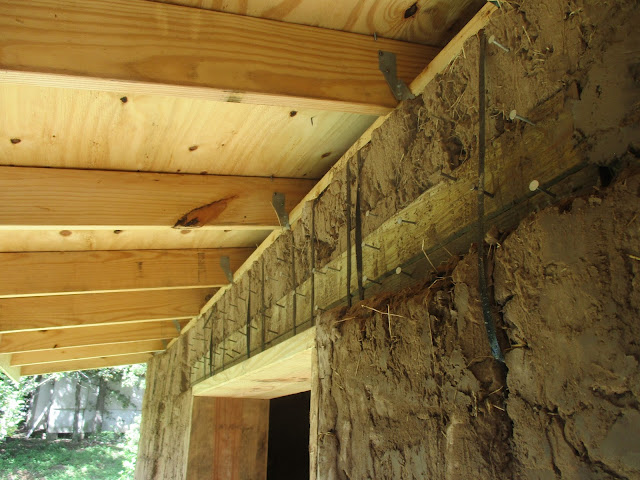T-Brick Shed: Wall Leveling
We had a relatively cool August which gave me false hope that September would be more fallish rather than summerish. So with the building pretty well protected I felt I could skive off until cooler temperatures arrive. A few days this month I've dabbled with the first leveling coat of plaster. The walls are pretty even and straight but there are some pits and pockmarks from the pre-roof days. There are also some bulges created when the T-brick forms would flare out at the bottom. We decided we were okay with a little undulation but I wanted to try to even things out some.
I went to work at the bulges with a machete which was an easy enough job when the mud was still fairly fresh. After setting up for several months it's a different animal though. I spent one morning hacking away without much to show for it. My Dad took the opportunity to peruse his favorite store, Harbor Freight. He came back in the afternoon with grinder/buffer tool that worked beautifully.
After getting the bumps leveled off, I started filling in the low areas. I'm using the same dirt I built the walls with minus the straw. I was having issues spreading the mixture because lumps in the mix. Today I made a sieve from scrap wood and hardware cloth to separate out the bigger chunks. Application became much more fluid.
 |
| Leveling off the bottle wall section with the machete I accidentally caught the end of a bottle and broke it off. I guess I'll have to get Jean to drink some more beer. |
 |
| About half of the eastern wall is leveled. |
 |
| Going to work on the southern and western wall in the morning. |
 |
| Using the grinder to take out the bumpy bits. It gave me a pretty good dust bath. |
 |
| Misting the wall. If you add plaster to a dry surface, it will suck all the moisture out of your plaster and cause the plaster to crack. |
 |
| Sun's up, time to go the western wall. |
 |
| I custom made this sieve to fit on plastic container we had laying around. Once I separated out the finer material I mixed it into a slurry to spread on the walls. |
 |
| By mid-afternoon the western wall was looking pretty good. Some fine cracks had formed. We'll see what it looks like next week. |







Comments